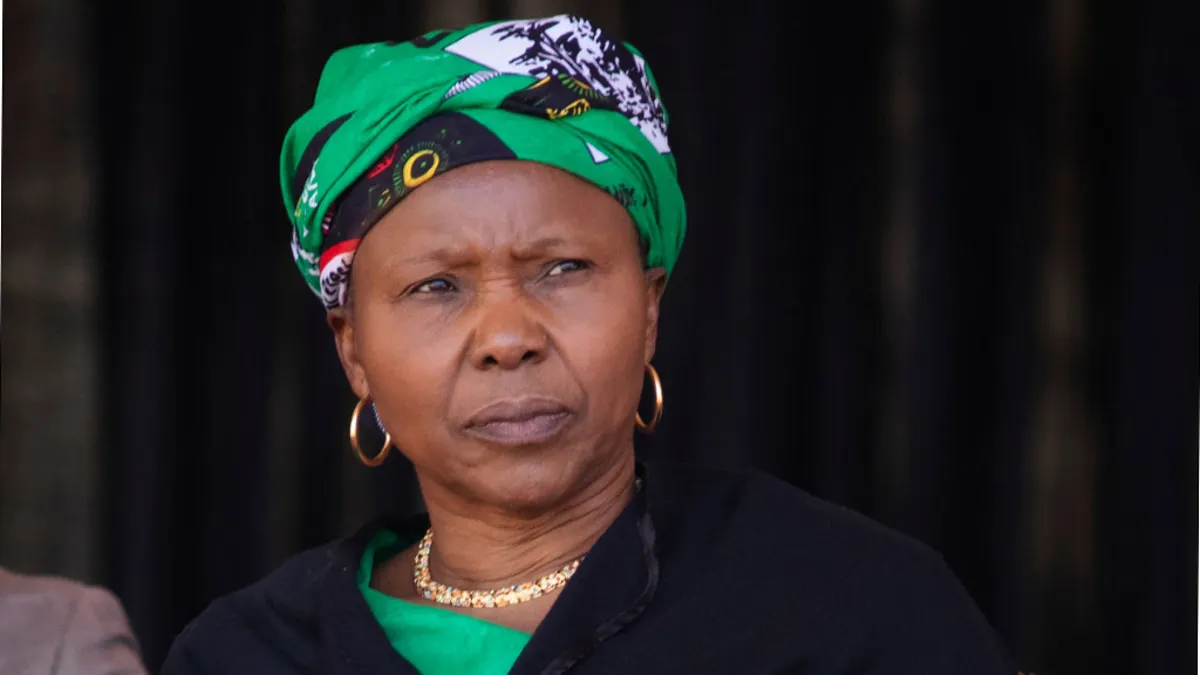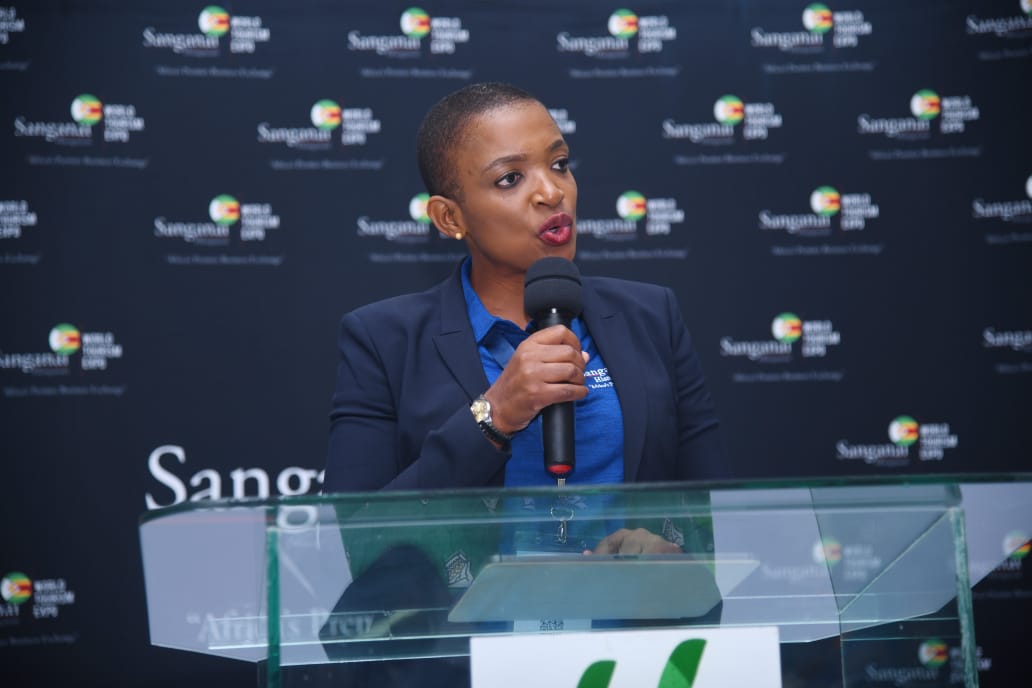Current Affairs
Zanu-PF 95 percent ready for Byo conference Preparations

By Sam Mupedziswa
ZANU PF National Chairman and Minister of Defence Honourable Oppah Chamu Zvipange Muchinguri-Kashiri is pleased to share the Party strategic direction for the upcoming 21st Annual National People’s Conference. The gathering, which will be held from October 22 to 27 at the Zimbabwe International Trade Fair grounds in Bulawayo, which marks a significant moment for our nation as it pushes forward towards achieving Vision 2030.
This is also a unique opportunity for Bulawayo to demonstrate its capacity to host large-scale national events and showcase its vibrancy and readiness for greater things.
In preparation for this conference, the National Co-ordinating Committee, which Cde Oppah Chamu Zvipange Muchinguri-Kashiri chair, has made critical decisions aimed at ensuring an impactful and efficient conference. One of the key measures they have taken is to reduce the number of delegates attending this year, drawing lessons from best practices they have observed in other nations like China.
This year’s conference will not follow the traditional format where every member of the party attends. We have opted to limit participation to Politburo members, Central Committee members, National Consultative Assembly members, and senior provincial and district executives. This will ensure that the discussions and resolutions are rich in content, driven by critical thinking and rigorous debate, thus creating meaningful outcomes that will influence the course of our national policies.
The reduced number of attendees also reflects our commitment to safety. With fewer delegates traveling to Bulawayo, we will significantly minimize road traffic accidents, which is a priority for the party and the nation said Cde Muchinguri Kashiri.
The conference theme is, “Industrialise, Modernise Towards Vision 2030,” which aligns perfectly with the nation’s developmental goals. The country look to industrialize and modernize, key sectors such as the economy, agriculture, and food security will be at the forefront of the Party discussions. “Together, with the Party we will chart a path that delivers prosperity to our people and restores our country’s position of dignity and self-reliance,” said Chairman Muchinguri Kashiri.
Kashiri added, “I can report with pride that we are nearly 95 percent prepared for the conference. Our third meeting as the National Co-ordinating Committee has ensured that all logistical matters are in place. This committee is comprised of all relevant departments, whose expertise is crucial in delivering a successful and productive conference.”
At this important gathering, Minister of Finance, Economic Development, and Investment Promotion, Professor Mthuli Ncube, will present a comprehensive report on the state of the economy. His insights will be instrumental in guiding our future economic strategies. Similarly, the Minister of Mines and Mining Development, Cde Winston Chitando, will provide an update on the mining sector, while our Minister of Lands, Agriculture, Fisheries, Water, and Rural Development, Dr Anxious Masuka, will give a detailed report on the state of agriculture, including this year’s challenges, such as the drought that severely affected our country. Our Government, under the capable leadership of the Minister of Public Service, Labour and Social Welfare, Cde July Moyo, has already initiated interventions to ensure that no Zimbabwean will starve, and this will be discussed in detail she alluded.
This year’s conference is not just a gathering of party members but a critical policy review platform. We will take a hard look at our policies and refine them to ensure that they are in line with our national goals, particularly economic growth and sustainable development.
The outcomes of this conference will set the tone for ZANU PF’s continued leadership as we drive towards Vision 2030. Together, as one united party, we will steer our nation towards a prosperous future.
“I look forward to the rich debates and forward-thinking resolutions that will come out of this conference, and I am confident that it will be a significant milestone in Zimbabwe’s journey towards greatness,” Cde OCZ Muchinguri Kashiri added.

Current Affairs
Minister Rwodzi Charts Path as Sector Takes Lead in GDP Growth

Itai Mazire
Tourism and Hospitality Industry Minister Barbara Rwodzi has implored players in the sector to embrace innovation, sustainability, and stronger partnerships to safeguard Zimbabwe’s tourism gains, as the industry now leads national GDP growth ahead of mining and agriculture.
In a speech delivered on her behalf by Tourism Permanent Secretary Dr. Takaruza Munyanyiwa at the Hospitality Association of Zimbabwe (HAZ) Summit and Annual General Meeting in Harare today, Minister Rwodzi said the country stood at a “historic crossroads” following its recent listing by Forbes as the best destination to visit in 2025.
“This is a well-deserved accolade which we should celebrate and sustain going forward. Congratulations, makorokoto, amhlope to the service providers of the tourism and hospitality industry of Zimbabwe.”
The Minister applauded the sector’s resilience in the face of pandemics, economic headwinds, and climate-related shocks, noting that the spirit of Zimbabwean hospitality remains unbroken.
“We have continued to smile, to serve, and to tell our authentic story, hence reaping the rewards now,” she said.
Giving an update on performance, Minister Rwodzi reported that international tourist arrivals grew by 9 percent between January and September 2025 compared to the same period last year, with strong traffic from the Americas, Africa, and Asia.
Domestic travel also surged by 20.9 percent over the same period, while the sector generated approximately USD 922 million in 2025 a 10 percent rise from the USD 839 million recorded last year.
“These are encouraging signs that our recovery is gaining positive traction. But future-proofing requires more than recovery it demands transformation,” she said.
Minister Rwodzi outlined five pillars she said would anchor the transformation of the sector: digitalisation; sustainable and climate-resilient tourism; human capital development; infrastructure and connectivity; and stronger branding and market diversification.
“The future of hospitality is digital,” she said. “We must move from brochures to big data, from paper-based booking to smart platforms.”
She urged operators to embrace online booking systems, virtual reality tourism aids, and other digital tools that enhance visitor experiences.
On sustainability, Minister Rwodzi said protecting Zimbabwe’s natural and cultural heritage was “not an expense it is an investment in the longevity of our industry.”
The Minister stressed the need to invest in human capital, calling on operators to work closely with academia to bridge skills gaps and develop tomorrow’s hospitality innovators. She highlighted the First Lady, Dr. Auxillia Mnangagwa’s gastronomy vision as a key avenue for elevating Zimbabwe’s culinary offerings.
On infrastructural development across the country, she said it remained central to competitiveness: “A tourist’s journey begins long before they reach our front desk — it begins on a road, a runway, or a mobile network.”
Minister Rwodzi reiterated that Government is committed to creating an enabling environment, pointing to the recent reduction of tourism fees by up to 50 percent to lower operating costs.
“Future-proofing cannot be achieved by Government alone,” she said. “The private sector is the engine of creativity, investment, and service excellence.”
Her call for collaboration was anchored on an African proverb which states that, “Tomorrow belongs to the people who prepare for it today.”
The Minister said the role of HAZ remained critical as Zimbabwe eyes increased international tourist inflows.
“The world’s eyes are turning towards Zimbabwe. We have the assets, we have the people, we have the passion so why not?” she said.
“To HAZ, your role has never been more critical. You are the unified voice of the hospitality industry. Your strength lies in your collective action.”
She said the ongoing summit provided a platform to “strategise, innovate, and build consensus” as the sector pushes towards Vision 2030.
“The potential is vast. The time is now. Let us build not just an industry, but a legacy,” said Minister Rwodzi.
Current Affairs
Apostolic Church Founder Paul Mwazha Dies at 107

Zimbabwe and the wider African Christian community are mourning the loss of Bishop Paul Mwazha, the revered founder of the Apostolic Church in Africa, who passed away today at the remarkable age of 107.
Bishop Mwazha, widely regarded as one of the continent’s most influential religious leaders, dedicated his life to the growth and spiritual guidance of his church, which boasts millions of followers across Zimbabwe and beyond. His teachings, rooted in faith, discipline, and community service, have left an enduring legacy that continues to shape generations.
The Apostolic Church in Africa under his leadership became a cornerstone of spiritual life in many communities, providing not only religious guidance but also social support and education initiatives. Church leaders have called for prayers as they prepare for national and regional mourning rituals.
Further details on funeral arrangements and memorial services are expected to be released in the coming days.
Business
Zimbabwe Bets Big on Biotech to Fuel Industrial Revolution


Dr. Eng. Willie Ganda
By Enia Dube
The Minister of Higher and Tertiary Education, Innovation, Science and Technology Development, Hon. Dr Fredrick Shava, has thrown his weight behind biotechnology as a key driver of the country’s industrialisation and modernisation agenda.
Speaking at the National Biotechnology Authority (NBA) Strategic Planning Workshop in Kadoma, Dr Shava urged the Authority to identify biotechnology-led opportunities that can boost national production and accelerate economic growth.
“Biotechnology serves as a key catalyst for NDS2 implementation, advancing inclusive economic growth, job creation, and sustainable industrial development,” Dr Shava said, emphasising the need to integrate biotechnology into national value chains to unlock a biotechnology-driven economy. He added that this would turn innovation into industry, knowledge into enterprise, and science into jobs.
The NBA has made notable progress in establishing a strong regulatory framework, promoting biotechnology research and commercialisation, and raising public awareness about the sector’s potential. The Authority has successfully commercialised products such as Mapfura wine and Cofsol cough syrup, and has several other biotechnology products in the pipeline.
Incoming NBA Board Chairperson, Professor Idah Sithole-Niang, echoed Dr Shava’s sentiments, emphasising that the Authority’s five-year strategic plan must meaningfully contribute to the attainment of Vision 2030. “This event marks a significant milestone in the Authority’s ongoing efforts to enhance the role of biotechnology in Zimbabwe’s socio-economic development,” she said.
The workshop aimed to realign priorities and resources in response to emerging technologies and global biotechnology trends, and develop a strategic roadmap to strengthen biotechnology as a key driver of Zimbabwe’s socio-economic transformation. The rapidly evolving global biotechnology landscape, including advancements in gene editing, bio-manufacturing, and climate-smart innovations, presents both new opportunities and challenges for Zimbabwe.
“We recognise the pressing need for an inclusive and forward-looking strategic plan that can navigate the complexities of the biotechnology landscape,” Professor Sithole-Niang noted. The workshop was attended by researchers, government officials, and NBA staff, who are optimistic about the potential of biotechnology to drive Zimbabwe’s economic transformation and achieve Vision 2030.
-

 Current Affairs1 week ago
Current Affairs1 week agoOperation restore order
-

 Crime and Courts2 months ago
Crime and Courts2 months agoMasasi High School Abuse Scandal Sparks Public Outcry
-

 Crime and Courts2 months ago
Crime and Courts2 months agoKuwadzana Man Jailed for Reckless Driving and Driving Without a Licence
-

 Current Affairs3 months ago
Current Affairs3 months agoMunhumutapa Day: Zimbabwe’s Newest Public Holiday Set for Annual Observance
-

 Current Affairs4 months ago
Current Affairs4 months agoBreaking: ZIMSEC June 2025 Exam Results Now Available Online
-

 Current Affairs1 month ago
Current Affairs1 month agoBREAKING NEWS: ZANU PF Director General Ezekiel Zabanyana Fired
-

 Current Affairs3 months ago
Current Affairs3 months agoGovernment Bans Tinted Car Windows in Nationwide Crime Crackdown
-

 Current Affairs2 months ago
Current Affairs2 months agoExposed: Harare GynecologistChirume Accused of Negligence, Extortion, and Abuse


